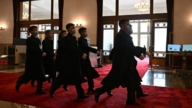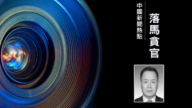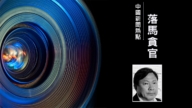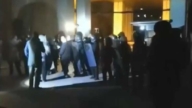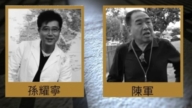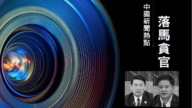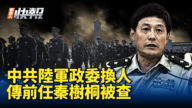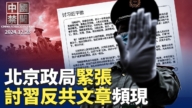【新唐人2013年08月19日讯】中共党刊《求是》杂志最近发表文章,直白入骨的承认,媒体不能实行西方的新闻体制,也不能实现媒体自由,必须为党服务。同时,文章还以抹黑西方新闻自由的方式为自己开脱。文章更自爆,在现阶段,中国承受不了舆论失控的后果。那么,中共为何强调媒体必须服从党性,大陆媒体为什么不自由?《求是》是如何进行狡辩的,请看报导。
《求是》杂志社长李宝善,在标题为《自觉坚持马克思主义新闻观》这篇文章中承认,西方新闻观强调新闻的一般属性。马克思主义新闻观则强调新闻的党性。中国为什么不能实行西方的新闻体制?答案其实很简单:中国是社会主义国家。
大陆长城抗战网主编 贾元良:“大陆对于新闻自由一直都是有控制的,而且会根据不同的政治氛围,管理的制度都是不一样的,我都能感觉到。国内最近发生了一些事件,言论语言民众抱怨比较多,对于言论的控制,他们有些人认为会危及到中共的领导权。”
旅居德国的政治评论家仲维光指出,中国各阶层都对中共限制新闻自由存在不满,但新闻自由还是要靠民众自己不断去抗争才能实现。
大陆长城抗战网主编贾元良认为,现在中国社会矛盾极其尖锐,互联网的发展使得中共没办法完全控制信息。
李宝善在文章中还提到,过度批评会损害政府威信、妨害施政﹔中国在现阶段,承受不了舆论失控的后果。他还大肆称赞,中共要求的“新闻媒体坚持正面宣传为主”所谓方针。
时事评论员 蓝述:“为共产党这个集团服务,为它取说好话,这是它对‘积极’的定义,这个只有它自己承认的。如果它今天开放了,如果它确实真的在为中国社会积极正面的报导,那它为什么害怕竞争呢,从另外一个角度说明中共这个政权有多脆弱,只能靠假话来维持。”
曾经去过台湾旅游的中国民众都知道,台湾各种媒体让人应接不暇,却没有像严格控制媒体的大陆社会乱相百出。
李宝善还用国外是“私人办媒体,资本垄断”来为中国的媒体环境不自由开脱。他声称,“社会主义国家不会允许新闻媒体私有化”,这是与资本主义新闻体制的所谓区别。
蓝述:“西方媒体它处在一个自由竞争的环境里,它如果不代表主流民意的话,它在市场上很快就被淘汰,相反在中国,在中共极权的垄断之下,它本身就代表了少数的集团,今天世界上任何一个国家里,还能找到比中共更垄断的集团吗?”
李宝善企图用“默多克的新闻集团也控制了很多媒体”的例子,为中共控制媒体进行辩解,宣扬“西方独立媒体可以独立于政府、独立于政党,却不可能独立于资本。”事实上,默多克的新闻集团并不是靠资本或资本家办起来的
默多克出生于澳大利亚墨尔本郊外的一个农场。默多克的父亲是一名战地记者,自己办一份小报,逐渐扩大。 1952年,默多克父亲死于心脏病时,正在英国牛津大学读书的默多克赶回家中处理后事,发现父亲的报纸处于亏损状态,于是他设法保留住了《星期日邮报》(Sunday Mail)和《新闻报》(The News),通过与自己的主要竞争对手合并,才使《新闻报》开始盈利。一年之内发行量就翻了两翻。
中国问题专家 赵远明:“西方媒体可以问责政客,指责政党,批评政府,都是由于它实话实说,这就使西方媒体逐渐做大,不断扩大读者群。”
移民澳大利亚的中国问题专家赵远明指出,中共即使极尽全力,也很难完全控制信息和维持政权,但是李宝善的这番言论,折射出中共刁难耍赖的流氓本质。
采访编辑/刘惠 后制/葛雷
State-owned Media Attack Press Freedom with No Misgivings
Qiushi Journal, an organ of the Chinese Communist Party
(CCP), recently published an article boldly saying that
China cannot adopt the media systems of western countries
and freedom of the press, as all media must serve the party.
The article also attempts to discredit western media to
defend its argument.
It even admits that China (the CCP regime) is unable to
handle the consequences of uncontrolled media.
Why does the CCP always want the media to bend at its will?
Why is there no freedom for mainland China’s media?
How has Qiushi Journal justified its theory?
Let’s see the report below.
Li Baoshan, president of Qiushi Journal, is the author of
the article titled
“News media should consciously stick to Marxist ideology”.
Li admits in the article that, western media lay stress on
normal nature of news,
while Marxism regards party nature
of news as the most important.
Why is China unable to implement a western media system?
The answer is indeed a simple: China is a socialist country.
Jia Yuanliang, chief editor of the Great Wall War website:
“China has always had control over the freedom of the media.
I notice that they also adjust the degree of media control
according to different political climates.
Some domestic incidents that have recently occurred have
led to a lot of complaints from Chinese civilians.
Some party members believe that the issue of media control
may threaten the party’s rule.”
Zhong Weiguang, a political commentator living in Germany,
says that, in one way or another, people at all levels of
Chinese society are dissatisfied with the CCP’s media control;
however, press freedom depends on the people continuing to
take a stand over the long run in order to realize this freedom.
Jia Yuanliang says that the social conflicts inside of
China have become extremely intense.
Even in such a situation, the growth in internet use has
made it impossible for the party to implement complete information control.
Li’s article also says that “excessive criticism” may damage
the government’s credibility and result in impediment of administrations.
It claims that in the current stage, China isn’t able to
take the consequences of uncontrolled media.
Li also applauded the party’s so-called media principle
of “reporting its news mostly in a positive way”.
Lan Shu, political commentator: “The CCP’s definition of a
‘positive way’ is that which serves its interest group and that which glorifies the party.
This is accepted by nobody but the CCP itself.
If we remove the media control today, why should they
be afraid of market competition if their media have been
reporting the truth of China in a positive way?
This proves from another angle that the CCP’s regime is
so fragile that it can only be maintained by lies.”
All Chinese who once visited Taiwan should know that,
although Taiwan has many media with different styles,
it’s nothing like the chaotic state that has emerged
among the media in China’s strictly-controlled mainland.
In his article, Li Baoshan also attempts to justify China’s
media environment by claiming “western media are private but capital-monopolized”.
Li said, “a socialist country can’t allow privatized media”,
and that this marks the supposed difference
between media system of socialist and capitalist countries.
Lan Shu: “Western media are subject to free competition.
If failing to agree with mainstream opinions, they will be
eliminated from the market very soon.
In China it’s the opposite. Under the CCP’s dictatorship
and monopoly of political power, it only represents a very small minority of Chinese society.
In any country in the world today, is there a monopoly
greater than the CCP?”
Additionally, Li’s tried to justify the CCP’s media
control policy by saying,
“Rupert Murdoch’s News Corporation
also has control over a lot of media.”
It argues that “western media can be independent of
government or political parties, but they are never independent of capital.”
But in fact, Murdoch’s News Corporation
wasn’t initially founded upon capital or by capitalists.
Murdoch was born in a country farm in Melbourne, Australia.
His father is a war correspondent who later founded
a newspaper and developed it.
When his father died of heart disease in 1952, Murdoch,
who was studying at the University of Oxford,
returned home for funeral affairs.
At that time he found that his father’s newspapers
were in deficit.
Afterwards, Murdoch managed to carry on
Sunday Mail and The News,
and finally make benefits from The News
by merging with his main competitors.
In a year, the circulation of his newspaper had doubled twice.
Zhao Yuanming, China affairs expert: “Western media
can call for the accountability of politicians, and criticize
political parties or governments.
It’s only by reporting the truth to the public that western media
have gradually developed and expanded their audiences.”
Zhao Yuanming commented that, even at its full strength,
the CCP could still hardly implement complete information
control to maintain its governance.
Despite this, Li Baoshan’s article has clearly reflected
the CCP’s unscrupulous nature of distorting the truth by speaking deceptively.


